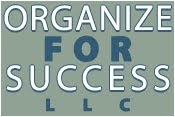Although the dictionary definition of productivity is "the quality, state or fact of being able to generate, create, enhance or bring forth goods and services", I think it is so much more than simply getting more done in less time; from my viewpoint, productivity is about efficiently working to effectively achieve results desired for all elements of life. The emphasis on each element of life fluctuates as priorities change while our actions and efforts in each element of life can complement the other elements rather than having them compete with each other.
All individuals must determine what is "right" for their own productivity based off varying priorities and desired results, knowing there is not one best way to do this. Here are 6 common themes in how I help my clients boost productivity:
- Time is a limited resource and needs to be invested wisely. Each day gifts us only 1,440 minutes; each week is only 168 hours. Saying yes to doing something means saying no to anything else using that time. Once we have lived that time, we cannot get it back; unlike money that can be invested to grow, the return on time spent must be greater than simply more time. How each of us measures the return on our time investment should reflect directly on our priorities.
- Clarity of priorities enables knowing which goals to tackle when. Every what assigned a when is more likely to get done because actions need time for their completion; since there is no "someday" on any calendar, especially for "I'll get to that someday", priorities give us a filter to determine which actions warrant an investment of our time. Whether you choose the Eisenhower Box, Stephen Covey's framework or another, there are tools to clarify what matters and drive action; pick what will highlight your priorities so you can get them done.
- Proactively planning your efforts will boost success for your goals. When a team goes into a game, its coaches have scouted the opponent, determined which of the team's strengths match up best to the opponent's weaknesses and created a game plan. Each team adjusts its game plan based off how the game progresses, but the chance of winning at all depends greatly on starting with a plan. The same applies to living your life: plan your weeks and days while making adjustments as time progresses so you attack your priorities instead of getting pulled into others' emergencies. With a plan, you can focus on what's important, not simply urgent, and what matters most to you finds time in your schedule.
- Distractions are extremely detrimental to your desired results. Research shows the average US office worker is interrupted 11 times each hour of the workday and, then, it takes 3 to 8 minutes to refocus, although it can take up to 25 minutes to really refocus when working in deep thought. I'm not a mathematician, but even I can deduce how that doesn't leave much time for getting things accomplished. Since time is so limited, reducing distractions is a valuable skill to learn.
- It is imperative to utilize all available resources. Each of us has different assets in our productivity toolbox, but we all have tools to use. Resources can include apps or websites, streamlined workflow processes, an organized space in which you know where things are stored, consultants hired for their expertise, employees or service professionals to whom you delegate (including house cleaners and chefs), calendars, timers, boundaries, to-do lists, email, automation and much more. Sometimes, an unbiased individual with a fresh set of eyes can best find additional sources of help, but there are always tools to support our efforts and make life easier.
- Work-life integration is a realistic way to tackle what matters most. In thinking about "balance", I see a scale, forcing a perception of costs needed for success; yet, I do not believe my "work" competes with my "life", seeing instead how they regularly complement each other. Although balance would be static, life is certainly not and requires fluid solutions to address one's ever-changing priorities for work, home, community or society and the private realm of mind, body and spirit. I help my clients recognize how any element we choose to have in our lives can add value to each of the other elements and how harmony is possible. As the various elements of life are layers on top of each other, the emphasis needed for each element continually fluctuates, and each layer adds value to the others, making the total greater than any part.


No comments:
Post a Comment